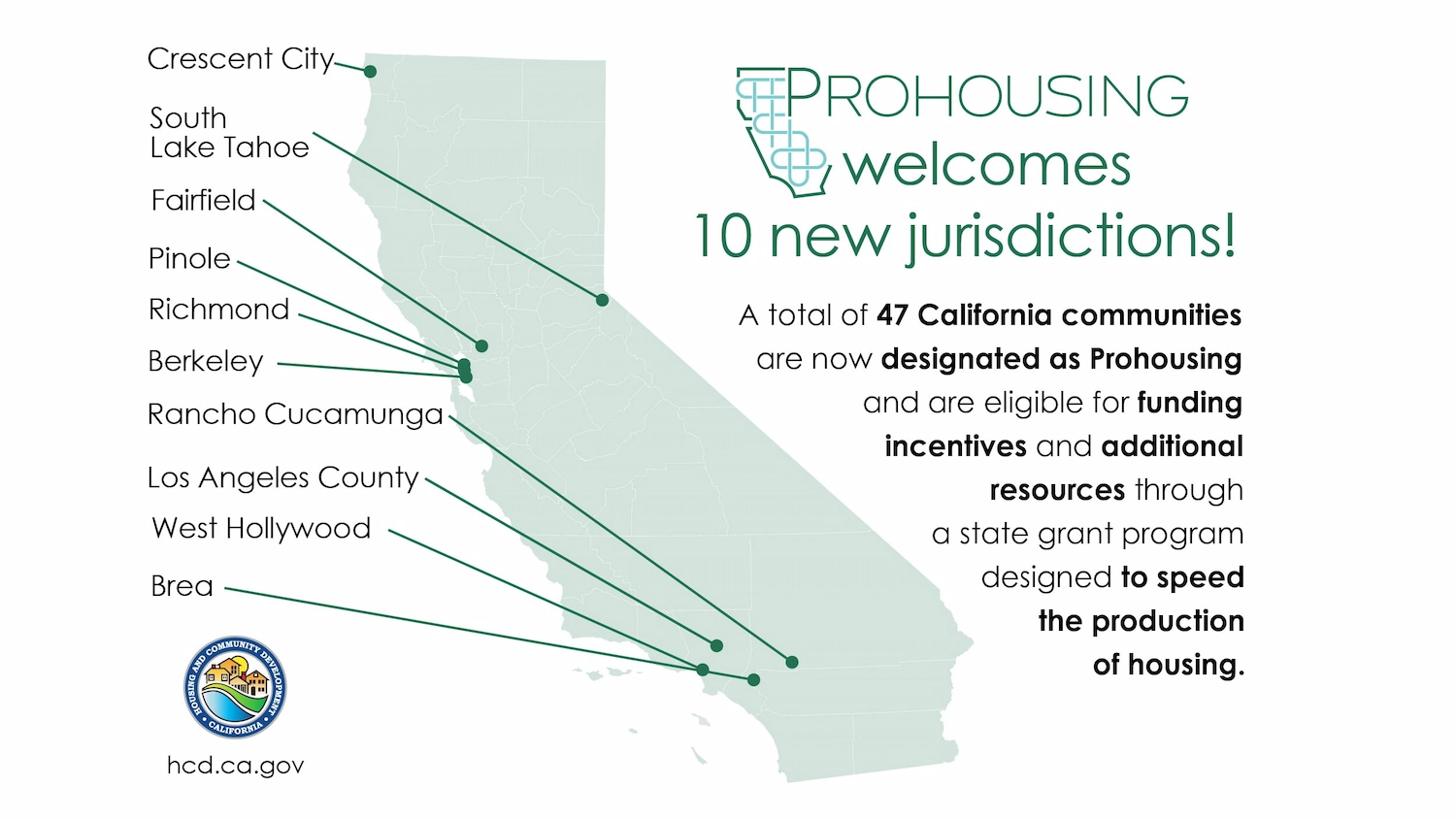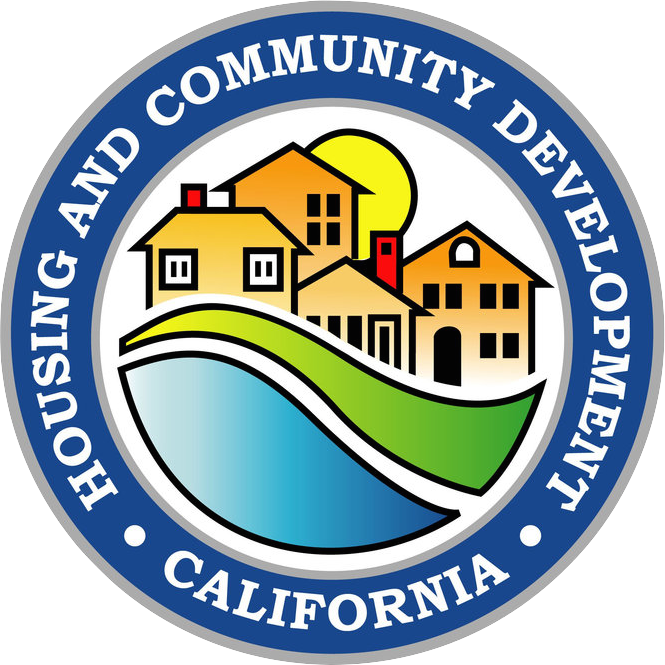California Recognizes 10 Communities for Prohousing Policies
Governor Newsom has now awarded 47 jurisdictions the coveted designation that makes them eligible for incentives to scale up efforts to advance housing
April 19, 2024

Sacramento, CA
Governor Gavin Newsom today announced that the cities of Berkeley, Brea, Crescent City, Fairfield, Pinole, Rancho Cucamonga, Richmond, South Lake Tahoe, and West Hollywood and the County of Los Angeles have earned the coveted Prohousing Designation for their efforts to encourage development of housing at all income levels. This designation comes with funding incentives and additional resources to help speed housing production. Today’s announcement brings to 47 the total number of California communities designated as Prohousing.
Why it matters: To meet the housing needs of all Californians, the state needs to plan for 2.5 million new homes over the next eight years, with at least one million serving the needs of lower-income residents. That critical goal can only be reached if local governments actively work to implement state housing laws and follow best practices that go above and beyond those minimum requirements. The Prohousing Designation rewards communities that are willing to cut through red tape, reduce construction and development costs, and create housing policies with a growth mindset by providing them with funding incentives and additional resources that help scale up those innovative efforts.
What Governor Newsom said: “At nearly fifty prohousing communities, California is making progress – but we can do better. At a time when the state is facing a housing crisis, every local jurisdiction should be stepping up to earn this distinction.”
The Prohousing Designation Program is part of a package of supports, incentives, and accountability measures established by the 2019-20 Budget Act. By earning the Prohousing Designation, communities receive exclusive access to Prohousing grants and additional points in the scoring of competitive housing, community development, and infrastructure funding programs administered by the Department of Housing and Community Development (HCD).
This includes the Prohousing Incentive Program (PIP), a grant program designed to accelerate affordable housing production and support preservation efforts. The 47 communities now designated as Prohousing were eligible to apply for a share of $9.5 million available in PIP Round 2, to be awarded this summer.
“Too often, we are forced to play the role of enforcer when bad actors try to stand in the way of needed housing,” said Business, Consumer Services and Housing Agency Secretary Tomiquia Moss. “It is so refreshing when we have opportunities like this to recognize our housing partners, who are working to strengthen communities and improve quality of life for all.”
“Earning the Prohousing Designation requires a strong, demonstrated commitment to tearing down barriers and working to create more housing faster,” said HCD Director Gustavo Velasquez. “I am grateful and hopeful when I see so many communities working with my team to learn what they can do to be great partners in the effort to ensure housing stability for all Californians.”
California offers incentives and supports to encourage communities to find creative solutions that break down barriers to much-needed housing production, such as accelerated production, equitable zoning, sustainable land use, reduced development costs, or financial subsidies. The 47 Prohousing communities have demonstrated they are actively working to help California meet its goal of permitting 2.5 million new homes by 2030. They have shown a commitment to working proactively to minimize obstacles, accelerate housing, increase availability of affordable housing, and combat homelessness – bettering the quality of life for all Californians.

City of Berkeley
The City of Berkeley offers incentives to produce housing, and its Prohousing application displays a strong commitment to improving housing access. In early 2021, the city removed the minimum parking requirement for single- and multi-family developments. Additionally, the city facilitates Accessory Dwelling Unit (ADU) production by prioritizing ADU permit applications, having one dedicated ADU planner, and providing a website with FAQs and links to ease ADU planning. Finally, the city’s Housing Trust Fund (HTF) policies authorize the regular release of development loan and Small Sites Program solicitations. These funds are available for affordable housing construction and are available to developers through a single application process. The HTF Small Sites Program supports the acquisition and renovation of occupied multifamily rental properties, conversion of rent-controlled properties to restricted affordability, and potential conversion to limited- or non-equity housing cooperatives.
City of Brea
The City of Brea’s Prohousing application demonstrates Prohousing principles by encouraging ADU production, providing incentives for housing, and establishing a local trust fund. The city recently adopted an ordinance with zoning code provisions for ADUs that goes beyond state requirements by allowing more than one ADU per lot. To encourage the assemblage of smaller existing parcels into larger parcels that can be more efficiently developed into mixed-use projects, the city’s zoning code includes a Parcel Consolidation Incentive Program provision. Such incentives include reduction in required parking for mixed use, increasing the maximum parcel coverage by up to 10 percent, and reducing common or open space requirements by up to 10 percent. The city’s budget now includes an Affordable Housing Trust Fund which is used exclusively for the development or maintenance of housing affordable to low- and moderate-income households. Finally, the city now offers an interest-free, deferred-payment rehabilitation loan program for single-family homeowners earning up to 80 percent of Area Median Income.
City of Crescent City
The City of Crescent City’s Prohousing application demonstrates a dedication to increasing housing supply, speeding up permit processes, and incentivizing development. The city has a Low- and Moderate-Income Housing Fund (LMIHF) to provide funds for new construction, acquisition, and rehab of affordable housing projects within the city limits. Crescent City also maintains a streamlined permitting review and processing that does not exceed four months, removing time and constraints to make it easier for projects to move forward and expand housing stock. Additionally, the city utilizes general funds to subsidize the cost for developers to apply for review of proposed applications with housing units, making it easier for projects to be completed and more housing units to be built.
City of Fairfield
The City of Fairfield’s Prohousing application lays out a variety of policies designed to further and expand housing production and help reduce development costs. Fairfield’s 2023-2031 housing element, which was recently certified by HCD, has identified capacity for 246% of the allocated RHNA units, far exceeding requirements set out by state law. The city has approved impact fee reductions for traffic impacts ranging from 24% to 35% for units in certain targeted infill areas. Also, the city established the Fairfield Housing Trust Fund (HTF) in 2021 and seeded it with $1.045 million. This will help create and preserve mixed-income and affordable housing initiatives in the city for extremely low- through moderate-income households.
City of Pinole
The City of Pinole’s Prohousing application reveals a variety of innovative policies. The city has implemented a zoning ordinance for on-site affordable housing that requires a minimum density for all developments and includes the option to modify development standards to promote greater development intensity. Modifications include reducing setbacks, parking requirements, and open space requirements and increasing density. The city also created an ADU Fast Track process, which would prioritize processing of ADUs. The city implemented a fee waiver that provides low- or no-cost building permits to age-qualified, extremely low- to lower-income households and qualified special need disabled households to make universal design improvements to their home. Finally, the city is partnering with affordable housing developers—utilizing the city’s grant writers—to support the identification, conceptualization, preparation, and submittal of grant applications for affordable housing projects.
City of Rancho Cucamonga
The City of Rancho Cucamonga’s Prohousing application exhibits policies and programs that support the acceleration of affordable housing. First, the city altered its zoning code to allow for mixed use developments, including medium- and high-density, in commercial zones. Additionally, the city has implemented a policy reducing the total number of public hearings from four to two by eliminating the Grading Review and Technical Review Committees, removing barriers to increased housing supply. The city also removed barriers for property owners to create ADUs by eliminating subjective design standards in the development code for ADUs. Finally, Rancho Cucamonga implemented a mobile home accord program to provide rent stabilization to seven mobile home parks and conserve existing housing stock for lower income households.
City of Richmond
The City of Richmond’s Prohousing application highlights new objective design standards, an ADU grant opportunity, and documented affordable housing practices. The city adopted the Richmond Livable Corridors Form-Based Code, establishing objective design standards to ensure that short- and long-term developments and capital improvement projects substantially improve quality of life for Richmond residents. Additionally, the city has adopted a Transformative Climate Communities Grant, which seeks to boost ADU/JADU production by providing free or discounted pre-approved floor plans and guides for low-income residents living within the designated project area. Finally, the city uses housing in-lieu fees and other city funds to support affordable housing development.
City of South Lake Tahoe
The City of South Lake Tahoe’s Prohousing application displays a commitment to furthering Prohousing goals by supporting public transport, allowing tiny homes, and increasing workforce housing supply. The city created an in-lieu fee to support public transportation. Developers can pay this fee to support public transportation access to a project site in place of some parking requirements and decrease parking requirements for qualifying projects located in close proximity to a transportation hub. The city instituted the Workforce Housing Funding and Inclusionary Housing Ordinance, which allows all in-lieu fees collected to be deposited into the workforce housing fund to provide funding for reasonable costs associated with the development of low- and moderate-income housing. Finally, the city has amended its residential development and design standards to establish clear requirements for moveable tiny homes that will reduce development costs.
City of West Hollywood
The City of West Hollywood’s Prohousing application shows a solid commitment to developing housing, supporting affordable units, and increasing its housing supply. Within the R-1 zone, which is the most prevalent throughout the city, West Hollywood permits duplexes and triplexes by right in transit-priority, high-resource, and highest-resource areas. The city also has an Affordable Housing Trust Fund used to support nonprofit development projects, with a requirement that at least 60% of units be affordable to low- and moderate-income households and at least 20% dedicated to low-income households. Similarly, the city now waives fees for housing projects in high-resource areas when more than 25% of units are affordable, and for development projects owned or occupied by nonprofit organizations. West Hollywood also administers $2.9 million in FY 2023 General Fund monies to assist with a rental inclusionary housing program of 17,175 units throughout the City.
County of Los Angeles
The County of Los Angeles’ Prohousing application shows a commitment to increasing the county’s housing supply, cutting approval process times, and bolstering resources for projects. The county is prioritizing permit processing for ADUs and affordable housing, with dedicated staff to review these projects. Affordable housing projects subject to an Administrative Housing Permit are reviewed within 90 days. The county now has three full-time ADU coordinators; offers fee reductions for affordable housing; waives Title 22 (Planning & Zoning) fees for 100% affordable projects; and reduces fees for partially affordable projects based on the percentage of income-restricted units provided. Finally, the county’s Affordable Housing Programs budget unit has been a pivotal funding source to address short- and long-term affordable housing for vulnerable populations. An initial $20 million dollar funding commitment in 2016 to produce and preserve affordable housing has evolved into an ongoing annual commitment of $100 million dollars since 2021.

